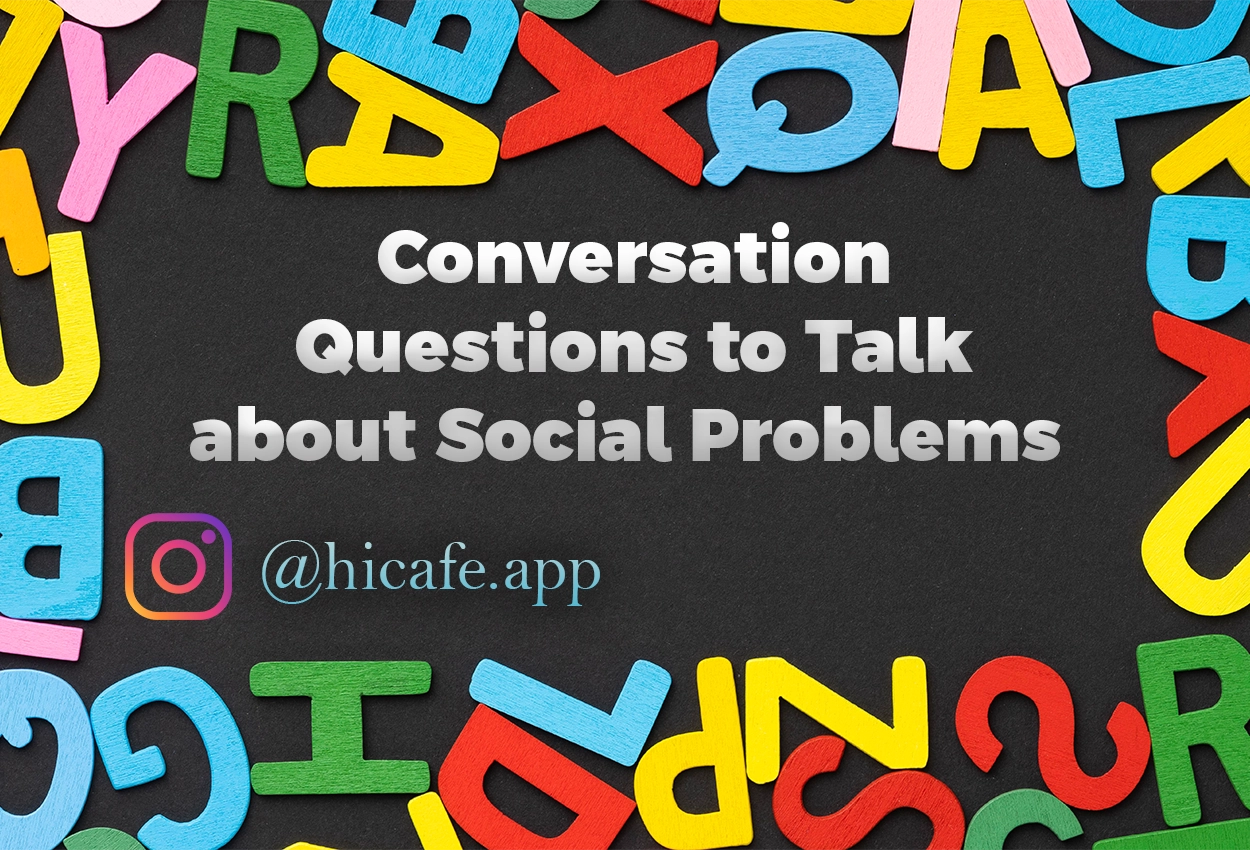Intermediate Level Conversations- Series 4- Lesson 5- ESL Questions about Social Problems
In this lesson, you learn 10 ESL questions about social problems with sample answers for having a normal conversation discussing social problems. We also have added 10 extra conversation questions if you decide to extend your discussion.
Previous Conversation Lesson
Conversation Questions about Science and Technology
Practice English Speaking by Talking about Social Problems
Here is a list of 10 discussion questions with sample answers for practicing English speaking with your language partner.
- Do you agree that teachers should use corporal punishment as a means of discipline? Why or why not?
No, I don’t think corporal punishment is ever okay. It’s a form of violence, and it’s harmful to children. It doesn’t teach them how to behave better; it just makes them afraid.There are many other ways to discipline children that are more effective and respectful.
- Do you think it’s acceptable for parents to use corporal punishment as a means of discipline? Why/why not?
Personally, I think corporal punishment is a bit outdated. It’s not about getting results, it’s about making the child feel bad. It teaches kids to be afraid of adults, not to be responsible. There are so many other ways to discipline a child, like talking about their behavior and explaining why it’s wrong, or taking away privileges. I think it’s more important to focus on teaching them good values and how to make better choices.
- Do you think people should be allowed to smoke in public buildings? Why or why not?
I think smoking should be banned in all public buildings. It’s harmful to everyone’s health, especially people who are sensitive to smoke or have breathing problems. It’s important to protect everyone’s right to breathe clean air.
- Do you think that minorities should be given job priority because of their race? Why/why not?
This is a complicated issue. While I believe in equality and fairness for everyone, I don’t think giving minorities job priority is the right solution. It could lead to resentment and discrimination against others. Instead, we should focus on creating a level playing field for everyone and ensuring equal opportunities through education and training.
- Have you ever experienced discrimination? Explain.
Yes, I have experienced discrimination. Unfortunately, it’s something that many people face, especially in Iran where cultural norms and traditions can sometimes lead to unfair treatment. It’s a sad reality, but I believe in fighting against discrimination and working for a more just and equal world.
- In an overpopulated world, should people be free to have as many children as they want? Why or why not?
It’s a tough topic. I understand the concerns about overpopulation and its impact on resources and the environment. However, I believe individuals should have the freedom to make choices about their family size. It’s a personal decision, and I think it’s important to respect individual choices.
- What are some reasons people use illegal drugs? Explain.
People use illegal drugs for many reasons, they might be trying to escape from difficult situations, such as poverty, trauma, or mental health issues.They might be influenced by friends or social groups who use drugs. They might also be curious about the effects of drugs.
- What are some reasons that people become homeless? Explain.
Homelessness is a complex issue with many contributing factors: Lack of affordable housing and income can make it difficult for people to find a place to live. Mental illness can make it challenging for individuals to maintain stable housing. Substance abuse can lead to instability and make it difficult to hold down a job or keep a home. People fleeing domestic violence might find themselves homeless.
- What are some things people can do to eliminate discrimination and prejudice? Explain.
We can work to eliminate discrimination and prejudice through education and open dialogue_ Encouraging open and respectful conversations about race, culture, and prejudice can help to break down stereotypes and misconceptions.
- What are some ways we can help homeless people? Explain.
Providing safe and affordable housing options is essential. Helping homeless people find jobs and become financially stable. Offering mental health care and addiction treatment can address the root causes of homelessness. Providing food banks, clothing, and other basic necessities can help to meet immediate needs.
Additional conversation questions about social problems
For a longer discussion, you can use the below conversation questions about social problems:
- What do you think is the most serious problem in the world? Why do you think so?
- Do you think vitro fertilization should be available to parents so they can choose the sex of their child? Why or why not?
- What do you think when you see a homeless person? Explain.
- What types of noise pollution do you hate the most? Explain.
- Who takes care of the elderly when they are no longer able to care for themselves? Explain.
- Is it morally right to spend a lot of money on pets, rather than helping people in need? Why or why not?
- Are you pro-life, or pro-choice? Why, and how do you see the opposing viewpoint?
- How would you prevent someone from committing suicide? Explain.
- How would you describe “positive discrimination”? Explain.
- How can rich countries help poor countries? Explain.
Next Conversation Lesson
Conversation Questions about Celebrities
Related Conversation Lessons
None
Practice Conversation with HiCafe App
By using HiCafe App, you can join free discussion events and Practice English Conversation online or in-person and improve your verbal skills.
All Conversation Lessons
To see and read all of our conversation lessons, you can visit our Improve English Speaking Skills page.



